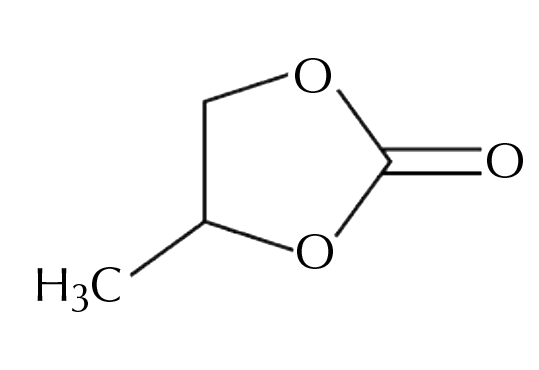What Is Propylene Carbonate?
Propylene carbonate is an ingredient that is used in cosmetics and skincare products. Propylene carbonate is mainly used to dissolve or suspend other ingredients in a formulation and also to decrease the thickness of formulations.
Propylene glycol is a small, water-soluble alcohol that is a very common ingredient in cosmetics and personal care products. It is a synthetic product obtained from the hydration of propylene oxide, which is derived from petroleum products. Therefore, propylene carbonate can also be considered a petroleum-derived product. Propylene carbonate is a colorless and odorless liquid.
In addition, to use in the cosmetic industry, propylene carbonate can be found in some adhesives and paint strippers. It is also used as a plasticizer, which means that it increases the plasticity or decreases the viscosity of a material.

Propylene Carbonate
the good:Propylene carbonate is mainly used to dissolve or suspend other ingredients in a formulation and also to decrease the thickness of formulations.
the not so good:Propylene carbonate can also be considered a petroleum-derived product, which isn’t necessarily a bad thing as it is highly purified.
Who is it for?All skin types except those that have an identified allergy to it.
Synergetic ingredients:Works well with most ingredients
Keep an eye on:Can cause some irritation, particularly in sensitive or irritated skin.
Why Is Propylene Carbonate Used?
In cosmetics and skincare products, propylene carbonate primarily functions as a solvent, meaning that it dissolves other ingredients. It is typically used at concentrations ranging from less than 0.1% to 5%. Propylene carbonate is used in the formulation of makeup, primarily lipstick, eye shadow, and mascara, as well as in skin cleansing products.
Texture
As a solvent, propylene carbonate helps to dissolve or suspend other ingredients in a formulation without changing the other ingredients. Propylene carbonate allows for an even distribution of all ingredients in a cosmetic formulation and creates an appropriate consistency for the product.
Thickness
Furthermore, solvents like propylene carbonate are used to thin out formulations and decrease viscosity. The term viscosity corresponds to the concept of ‘thickness’. Decreasing the viscosity of a formulation makes the product more spreadable when applied to the skin or hair. Solvents can also increase the efficacy of active ingredients in a product formulation by enhancing their absorption through the skin.
Is Propylene Carbonate Safe?
The safety of propylene carbonate has been assessed by the Cosmetic Ingredient Review Expert Panel, a group that evaluates the safety of skincare and cosmetic products. In clinical studies, undiluted propylene carbonate was found to be moderately irritating to the eye and skin, but it was non-toxic by inhalation exposure.
Products containing up to 20% propylene carbonate were determined to be moderately irritating to human skin, however, they were non-sensitizing, non-phototoxic, and non-photosensitizing. It should be noted that this concentration is much higher than the concentrations typically used in cosmetic formulations, which range from less than 0.1% to 5%. After evaluating the scientific data, the Expert Panel concluded that propylene carbonate was safe as a cosmetic ingredient in the present practices of use and concentration.
The United States Food and Drug Administration has reviewed the safety of propylene carbonate and approved its use as an indirect food additive as a component of adhesives.







